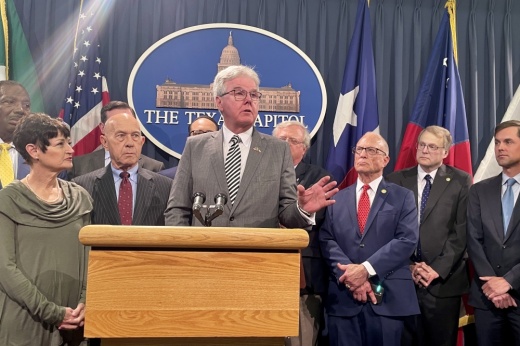The $18 billion proposal would reduce school district tax rates, increase tax exemptions for homeowners and cut taxes for small business owners.
But with one week until the 30-day special session ends June 28, the Texas House is unlikely to approve the new plan. Both chambers of the Legislature must approve a bill before it can head to the governor’s desk and become law.
House lawmakers passed a governor-approved property tax bill May 30 and immediately adjourned for the rest of the special session. Abbott previously sided with the House in the ongoing property tax battle.
“I want to thank the Texas House for bringing the Senate together,” Sen. John Whitmire, D-Houston, said at a June 20 news conference, drawing laughter from his fellow senators. “But enough is enough.”
Lawmakers said the new proposal, Senate Bill 26, would provide “the largest tax cut in Texas history,” benefitting homeowners and businesses.
Breaking down the bill
“This bill will give homeowners approximately a 41% cut in their school taxes,” said Lt. Gov. Dan Patrick, who leads the Senate. “It will give businesses the biggest tax cut they've ever had. It preserves the homestead exemption.”
Raising the homestead exemption, which is the portion of a home’s value that cannot be taxed, is a top priority for the upper chamber. Patrick and senators have argued that a larger homestead exemption will give Texans the most property tax relief, rather than simply reducing school tax rates, a plan supported by Abbott and the House.
Texans currently receive a $40,000 homestead exemption, but the Senate’s proposal would increase it to $100,000. The bill would also reduce the taxes Texans pay to school districts by 30%.
Sen. Paul Bettencourt, R-Houston, said the average homeowner would pay at least $1,270 less on next year’s property tax bill. Bettencourt, a tax adviser and former Harris County tax assessor-collector, wrote SB 26 and sponsored various legislation to cut property taxes this year.
SB 26 would also raise the state franchise tax exemption, preventing businesses that make less than $2.47 million each year from paying that tax. This would free approximately 67,000 small and midsize businesses from the franchise tax, according to Bettencourt’s office.
Running out of time
“We ask our colleagues in the House to come back and give this bill serious consideration,” Patrick said. “Taxpayers are waiting for their tax cut, and the clock is ticking.”
Patrick said the House and Senate have about six weeks left to agree on and pass a property tax bill, as Texas voters would have the option to approve the tax cuts during the Nov. 7 election. According to the Texas secretary of state, Aug. 21 is the last day to order an election on a measure.
“People need to stop feeling like they’re renting their homes from the state,” said Sen. José Menéndez, D-San Antonio. “At the end of the day, this isn’t Senate versus House. This is about us representing the same people: the Texas taxpayer.”
Renae Eze, a spokesperson for the governor’s office, said Abbott “encourages the two chambers to work towards a solution” and send it to his desk.
Abbott previously told reporters he would call as many special sessions as it takes for lawmakers to come to an agreement on property tax cuts.
House Speaker Dade Phelan formed a special committee to study property tax relief June 20. The bipartisan committee includes 13 lawmakers and three members of the public: Cheryl Johnson, Galveston County tax assessor-collector; Brad Livingston, former CEO of the Texas Department of Criminal Justice; and Don Miller, owner of the County Line restaurant franchise.
“We understand the challenges posed by skyrocketing property taxes require a multifaceted approach,” Phelan said in a news release. “This committee will engage in a thorough analysis of the factors influencing property taxes, and consider the effectiveness of various solutions ... including the possible elimination of property taxes altogether.”





